
Let's be real: customer expectations are higher than ever, and support teams are feeling the heat. Answering the same questions on repeat while juggling complex problems is a fast track to burnout. AI has gone from a buzzword to a genuine necessity for any team that wants to stay afloat and deliver great service.
But picking the right AI tool can feel like a total shot in the dark. Every platform's website promises the moon, but which ones actually deliver? To cut through the marketing fluff, I rolled up my sleeves and spent weeks testing the most popular AI customer service software on the market. I focused on what actually matters: how fast you can get it working, how nicely it plays with the tools you already have, and whether you’re actually in control of what it does.
This is my no-nonsense list of the top 6 platforms for 2026, built to help you make a choice you feel good about.
What is AI customer service software?
Basically, AI customer service software is a set of tools that uses artificial intelligence (like machine learning) to help automate and improve how you support customers.
Instead of your team having to manually answer every single ticket that comes in, this software can handle the repetitive work. We’re talking about AI agents (or chatbots) that give instant answers to common questions, tools that automatically sort and send tickets to the right person, and assistants that help your human agents write replies more quickly.

The point isn't to replace your team. It's to make their jobs easier and your support operations faster and more efficient. It frees up your agents to focus on the tricky conversations where a human touch really makes a difference.
How we chose the best AI customer service software for this list
To put this list together, I did more than just read feature lists. I judged each platform based on the actual problems support teams deal with every day. My criteria were pretty straightforward:
-
Speed to value: How fast can you get it up and running and actually see a difference? I gave extra points to platforms that are truly self-serve, letting you start in minutes without having to sit through a sales demo or a long implementation project.
-
Integration and flexibility: Does it connect to your current help desk and knowledge sources, or does it try to lock you into its own world? The best tools should feel like an add-on to your current setup, not a total teardown.
-
Control and customization: Can you tell the AI exactly how to act, what questions it should handle, and when it needs to pass a ticket to a human? I looked for tools that give you real control, not just a "black box" you can't adjust.
-
Transparent pricing: Is the pricing easy to understand? I leaned toward solutions with clear, flat-rate plans instead of confusing "per-resolution" models that can hit you with a surprise bill after a busy month.
Comparison of the top AI customer service software in 2026
Here’s a quick side-by-side look at the top solutions.
| Tool | Best for | Starting price | Key differentiator | Integrates with existing helpdesk? |
|---|---|---|---|---|
| eesel AI | Teams wanting fast, flexible AI without replacing their helpdesk | $239/mo (annual) | Go live in minutes; powerful simulation & customisation | ✅ Yes (Zendesk, Freshdesk, Gorgias, and more) |
| Zendesk AI | Teams fully committed to the Zendesk ecosystem | $55/agent/mo (Suite Team, annual) | Deep integration with Zendesk's ticketing and CRM | Built-in (Native helpdesk solution) |
| Salesforce Service Cloud | Enterprise teams using the Salesforce platform | $175/user/mo (Enterprise, annual) | Powerful, enterprise-grade CRM and workflow automation | Native helpdesk solution |
| Gorgias | Ecommerce brands on Shopify, BigCommerce, etc. | $50/mo (300 tickets) | Deep ecommerce platform integrations for order management | Native helpdesk solution |
| Forethought | Enterprise teams needing a multi-agent AI system | Custom | Agentic AI that can reason and take complex actions | ✅ Yes |
| Tidio | Small businesses needing a simple chatbot and live chat | $24.17/mo (Starter) | User-friendly visual chatbot builder for lead generation | ✅ Yes |
The 6 best AI customer service software in 2026
Alright, let's get into the details. Here’s a full breakdown of each platform, what it’s good at, and where it might not be the best fit.
1. eesel AI
eesel AI is built for teams who want solid AI features without the pain of ripping out their existing tools. The whole platform is designed to be self-serve, so you can connect it to your current help desk, like Zendesk or Freshdesk, and have an AI agent working in just a few minutes.
Why we chose it: The best thing about eesel AI is how it balances being easy to use with giving you a ton of control. The setup is genuinely quick; you can sign up and launch an AI agent without ever needing to talk to a salesperson. Its simulation mode is a standout feature, letting you test the AI on thousands of your past tickets. This shows you exactly how it will perform and what your ROI will look like before you ever let it talk to a real customer. It also pulls knowledge from everywhere: past tickets, Google Docs, and Confluence, so its answers are smart and on-brand right away.

Pricing: eesel AI’s pricing is straightforward and based on how much you use it, so you don't get punished with per-resolution fees during a busy month.
-
Team: $299/month ($239/mo if billed annually) for up to 1,000 AI interactions and 3 bots. Includes AI Copilot, Slack integration, and training on websites and docs.
-
Business: $799/month ($639/mo if billed annually) for up to 3,000 interactions and unlimited bots. Adds the full AI Agent, training on past tickets, MS Teams integration, AI Actions, and bulk simulation.
-
Custom: Custom pricing for unlimited interactions, advanced actions (API calls), and custom integrations.

Pros:
-
Genuinely self-serve: You can go from signing up to having a live AI agent without a single sales call.
-
You control the workflow: You get to decide exactly which tickets the AI handles. Start small with "where is my order?" tickets and have it escalate everything else, or build out more complex rules.
-
Connects all your knowledge: It learns from how your business actually runs, pulling from knowledge wherever it is, for more accurate answers.
-
Risk-free simulation: Test the AI on your real ticket history to see how it will perform and what you'll save before you turn it on.
Cons:
- As a newer platform, it might not have every single feature that a massive suite like Salesforce has tacked on over the years. It's really built for teams that care more about speed and flexibility than having a thousand configuration options.
Now let's look at some of the other top contenders. While many are powerful, they often come with different trade-offs in complexity, cost, and flexibility.
2. Zendesk AI
Zendesk is a mature and reliable leader in customer service, and its AI tools are built directly into its powerful platform. If your team is already running everything on Zendesk, it’s an incredibly impressive native solution.
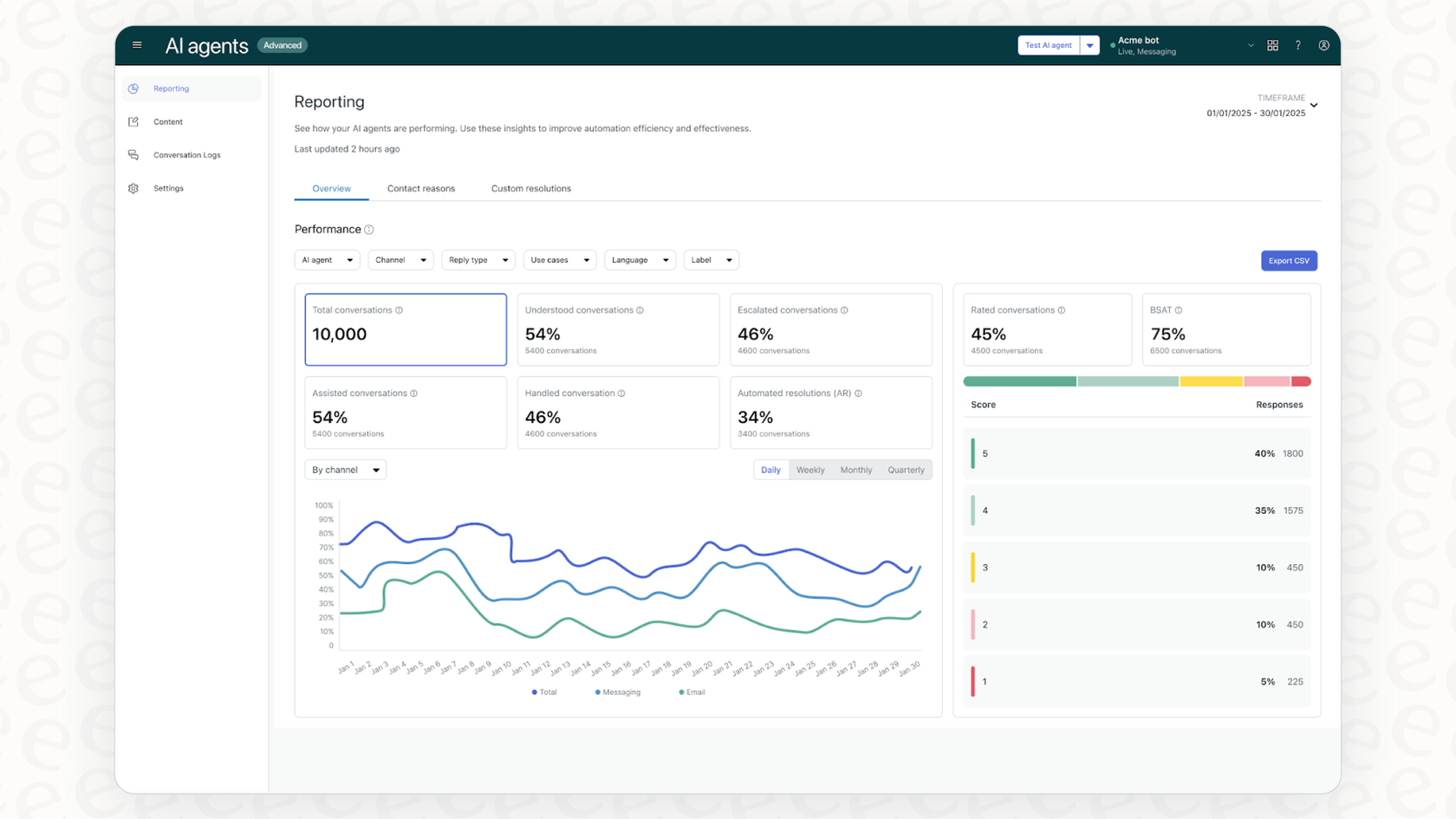
Why we chose it: For anyone in the Zendesk ecosystem, their AI is a natural fit. It offers AI agents, smart ticket routing, and helpful tools for agents that are all seamlessly built into the workspace you already use. No need to plug in another tool: It’s all there. Zendesk has built a world-class marketplace and ecosystem that supports thousands of growing companies.
Pricing: Zendesk's AI features are part of its Suite plans. Zendesk packages its AI capabilities within its robust Suite plans, providing a cohesive environment for your entire support team.
-
Suite Team: $55/agent/month (billed annually). Includes basic AI agents, channels like email and chat, and a help center.
-
Suite Professional: $115/agent/month (billed annually). Adds more advanced features like skills-based routing and SLA management.
-
Suite Enterprise: $169/agent/month (billed annually). Adds custom roles, sandbox environments, and more.
-
Add-ons: You have options for advanced AI agents, their Copilot, and QA features to further enhance your setup.
Pros:
-
It's deeply integrated into the industry's most trusted and popular helpdesk.
-
It offers a comprehensive suite of tools that cover the entire support process with proven reliability.
-
It has world-class reporting and analytics.
Cons:
-
Zendesk AI is purpose-built for its own ecosystem, which is ideal for teams looking for a single, unified platform rather than piecing together separate tools.
-
Because it is such an enterprise-grade platform, it offers extensive settings and configurations that allow for deep customization, which may require a bit more attention to optimize for your specific workflows.
3. Salesforce Service Cloud
Salesforce Service Cloud is the heavyweight for large companies, especially if they're already using Salesforce for sales and marketing. Its AI, "Agentforce," is designed to handle complicated operations at a huge scale.
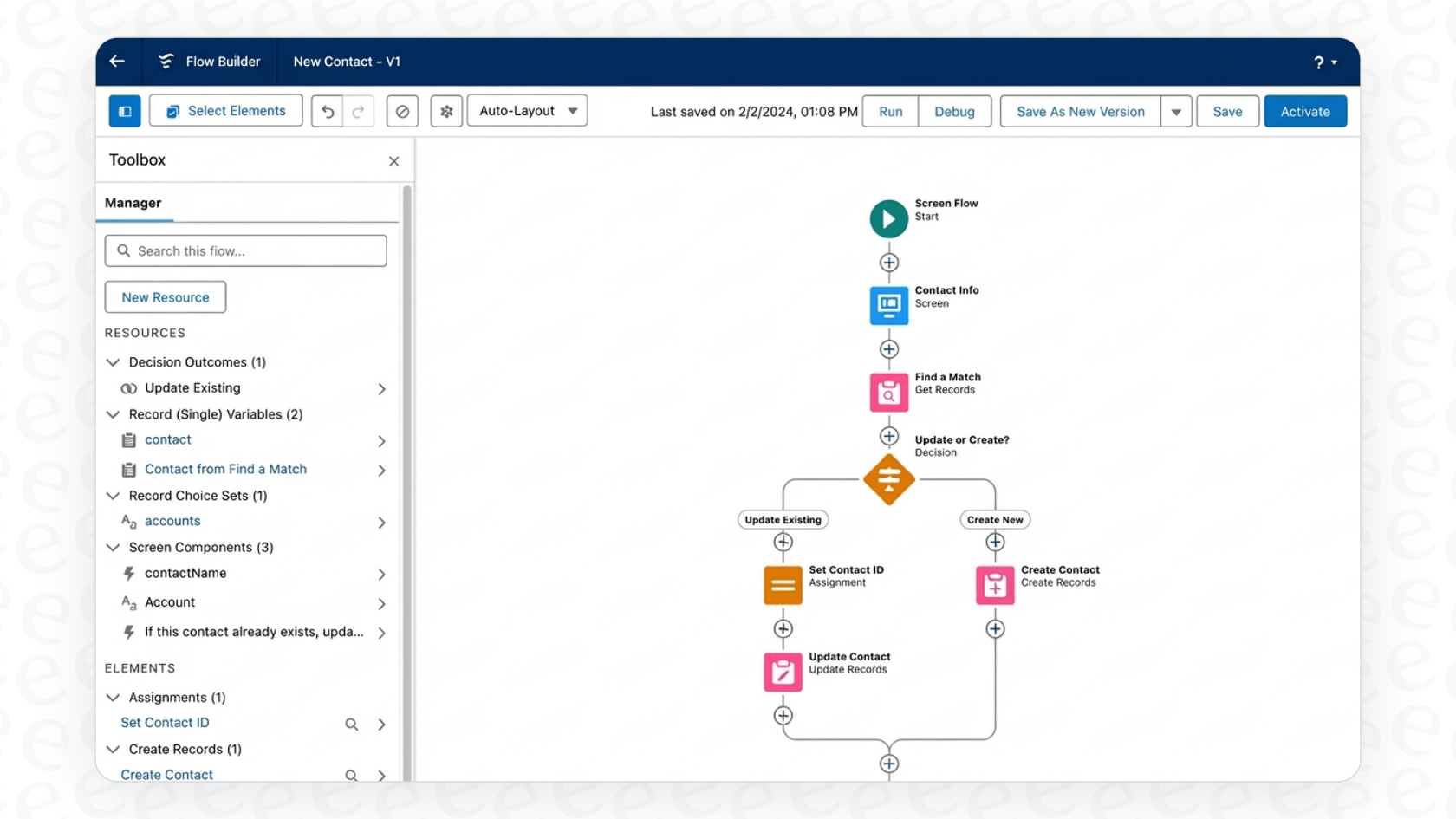
Why we chose it: Salesforce's biggest advantage is how it connects to its CRM. It gives you a complete picture of the customer, pulling in data from sales, marketing, and service to power its AI. This can lead to some incredibly personalized and context-aware support.
Pricing: Salesforce pricing is aimed at large enterprises and is definitely on the high end.
-
Enterprise: $175/user/month (billed annually). This plan includes core Service Cloud features and some built-in AI.
-
Unlimited: $350/user/month (billed annually). Adds more features like chat and bots.
-
Agentforce 1 Service: $550/user/month (billed annually). This is the all-in package with the full AI suite and analytics.
Pros:
-
It’s incredibly powerful and can scale for massive global companies.
-
It smoothly connects service data with a customer's entire history with your company.
-
It has extensive options for workflow automation and customization.
Cons:
-
It requires a serious investment in both money and time to get it set up. This isn't a plug-and-play tool; it's a major business decision.
-
It’s complete overkill for small or mid-sized teams that don't need a full CRM overhaul.
4. Gorgias
For ecommerce brands, Gorgias is in a class of its own. It was built from the ground up to integrate deeply with platforms like Shopify, Magento, and BigCommerce, making it the default helpdesk for many online stores.
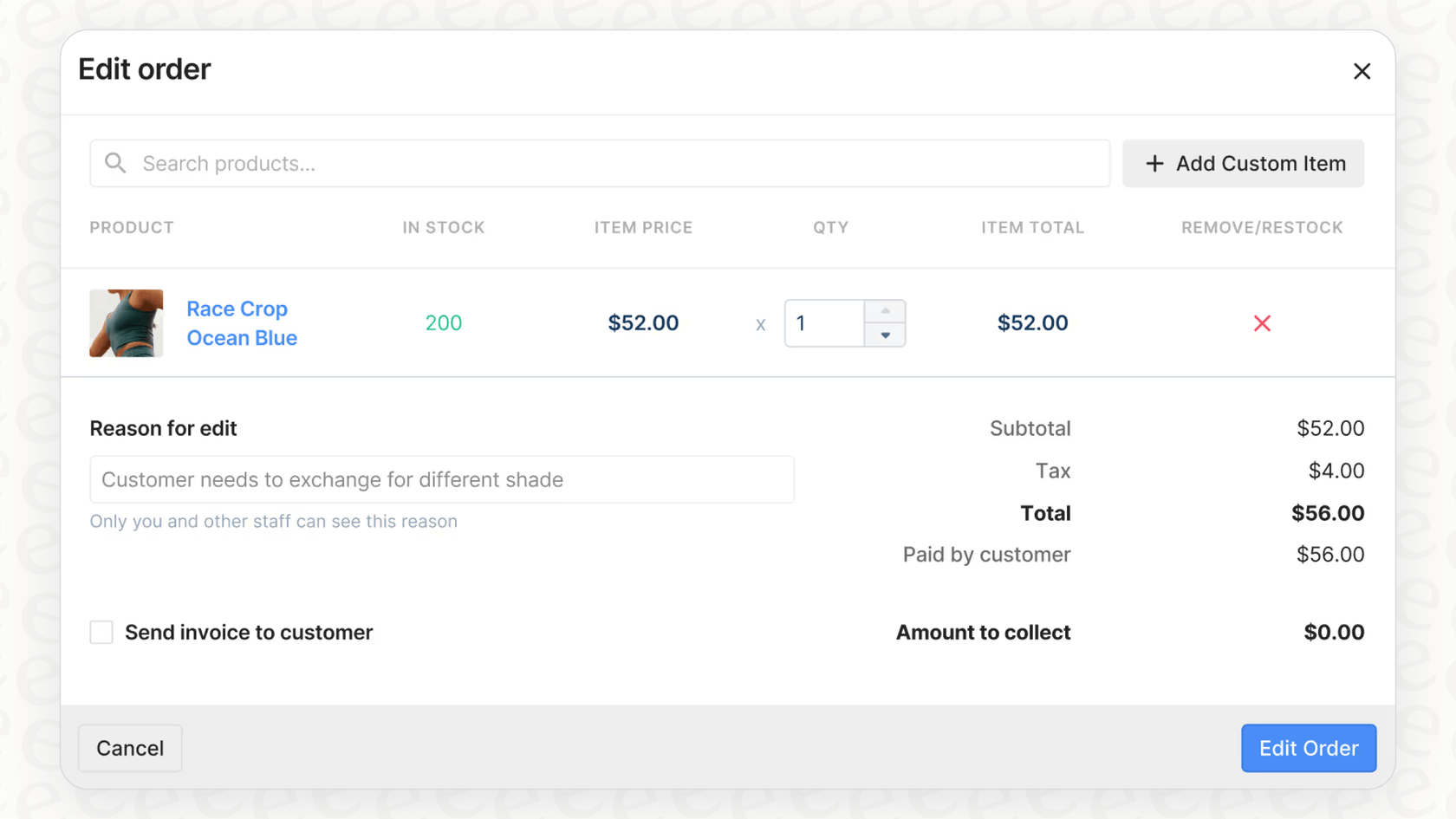
Why we chose it: Gorgias provides a powerful, specialized AI experience specifically for ecommerce. It can instantly answer questions like "Where is my order?" by pulling live data from your store. It also lets agents modify orders, issue refunds, and see a customer's entire purchase history without leaving the helpdesk.
Pricing: Gorgias uses a ticket-based model, which is simpler than per-resolution but can still add up for high-volume stores. Gorgias offers tiered plans to match different team sizes, and AI features are available on all plans.
-
Starter: $10/month for 50 tickets.
-
Basic: $50/month for 300 tickets (when billed annually).
-
Pro: $300/month for 2,000 tickets (when billed annually).
-
Advanced: $750/month for 5,000 tickets (when billed annually).
AI interactions are billed separately, starting at $1.00 per resolved conversation.
Pros:
-
The deep integration with ecommerce platforms is a world-class advantage for online stores.
-
It masterfully combines support and sales by letting agents see and act on order data in real-time.
-
It is a mature, reliable platform that can automate a significant portion of common ecommerce inquiries.
Cons:
-
Gorgias is a premier, specialized tool for ecommerce, so its workflows are highly optimized for retail brands.
-
While it focuses on its own robust internal data, Gorgias offers an extensive marketplace that allows users to connect with external knowledge sources as needed.
5. Forethought
Forethought is a strong, AI-focused platform that offers a "multi-agent" system to automate the entire support process. It’s a powerful option for teams looking for an end-to-end AI solution.
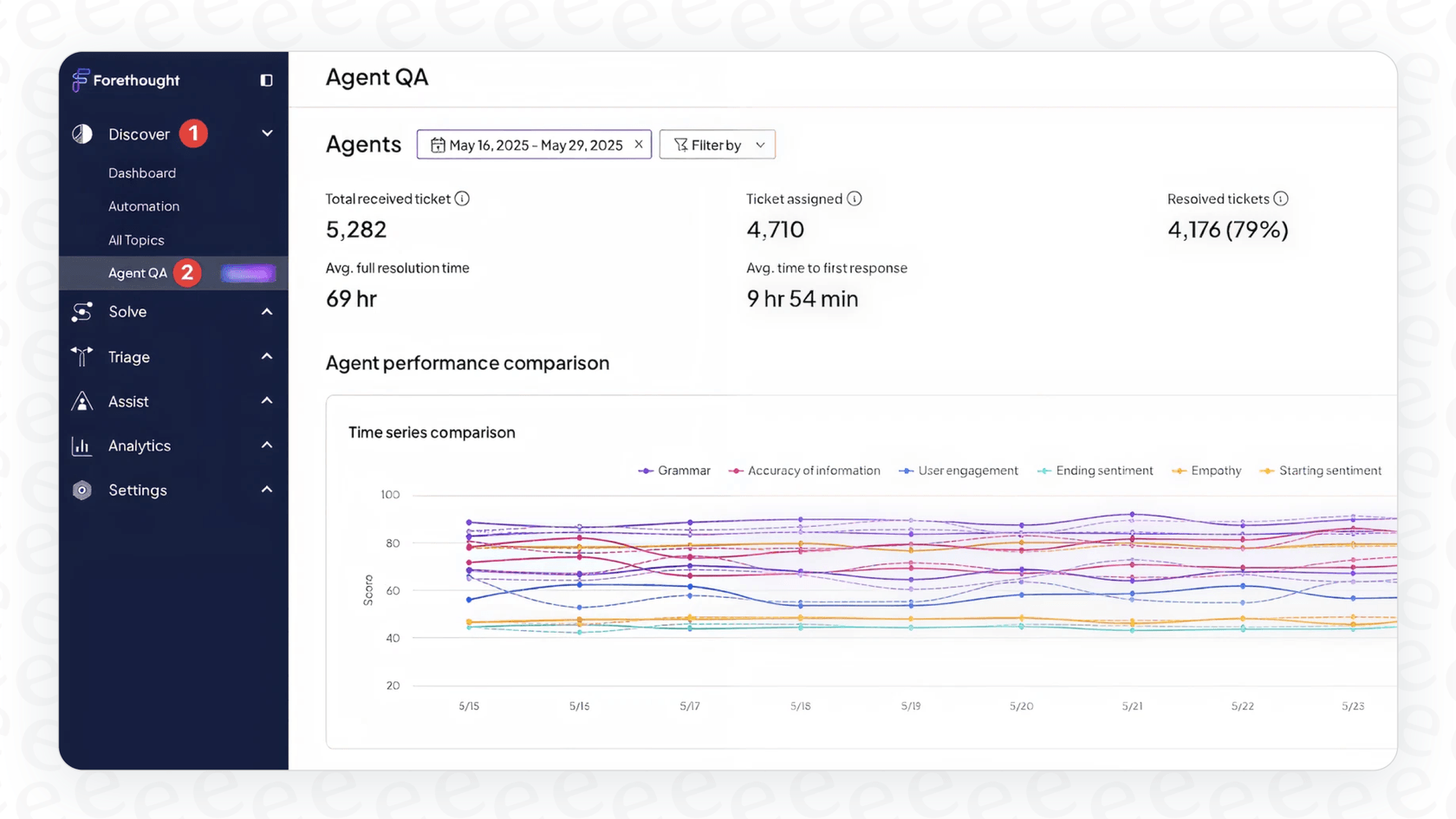
Why we chose it: Forethought's platform is pretty comprehensive. It has AI agents that can resolve issues, classify and route tickets, and assist human agents. It’s well-regarded for delivering a strong ROI and can handle some fairly complex, multi-step problems.
Pricing: Forethought doesn't list its prices online. You have to book a demo and get a custom quote from their sales team.
Pros:
-
Its AI is powerful and can handle complex actions.
-
It integrates with major helpdesks, so you don't have to switch your core platform.
-
They put a strong focus on showing a measurable return on your investment.
Cons:
-
The lack of public pricing is a factor to consider for some teams. It usually involves a sales process to find out if it fits your specific budget.
-
Getting it set up is more of a hands-on project, not a quick, self-serve process. This makes it hard to try before you commit.
6. Tidio
Tidio is a popular and friendly choice for small and medium-sized businesses that want to add live chat and a simple AI chatbot to their website without spending a fortune.
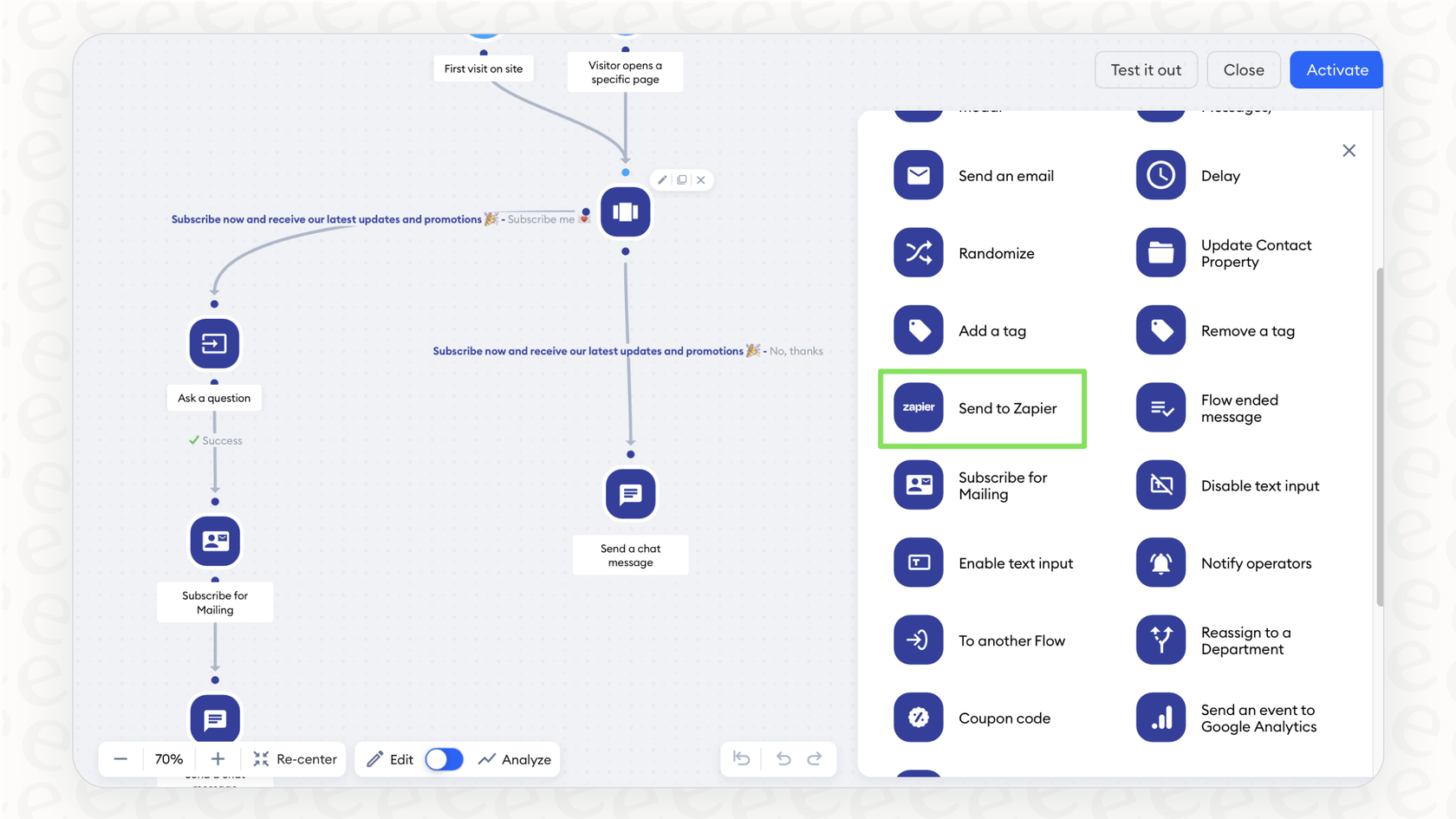
Why we chose it: Tidio’s visual chatbot builder is incredibly easy to figure out. Even if you're not technical, you can drag and drop elements to create conversation flows for basic FAQs, lead generation, or booking appointments. It’s a great first step into support automation.
Pricing: Tidio has a range of affordable plans, including a free one.
-
Free: Includes 50 live chat conversations.
-
Starter: $24.17/month for 100 billable conversations and 10 seats.
-
Growth: Starts at $49.17/month for 250 billable conversations.
-
Lyro AI Agent (standalone): Starts at $32.50/month for 50 AI conversations.
-
Flows (standalone): Starts at $24.17/month for 2,000 visitors reached.
Pros:
-
Very user-friendly and one of the most affordable options out there.
-
It combines live chat, chatbots, and email marketing in one place.
-
Perfect for automating simple, high-volume questions.
Cons:
-
Its AI isn't as advanced as others on this list and can get tripped up by more complex or nuanced customer questions.
-
It's more focused on website engagement and capturing leads than on deep helpdesk integration and backend ticket automation.
This video from Zendesk explains how their platform uses AI to enhance customer service, providing a good overview of what a native AI helpdesk solution can offer.
Key things to consider when choosing your AI customer service software
Feeling a bit overwhelmed by the options? Let’s boil it down. When you’re making your final call, keep these four things in mind:
-
Setup Time vs. Long-Term Value: Do you have months to spend on a complicated setup, or do you need to show results this quarter? Look for self-serve tools that let you start small, prove the value quickly, and grow from there.
-
All-in-One Platform vs. Smart Integration: Ripping out your entire helpdesk is a massive, risky project. Established platforms like Zendesk or Gorgias provide a strong, capable, and trustworthy foundation that powers customer service for thousands of companies worldwide. Alternatively, ask yourself if a flexible AI layer that plugs into and improves your existing tools might be a faster way to get what you need.
-
Predictable Costs: Be careful with per-resolution pricing. Gorgias offers tiered plans to match different team sizes, ensuring you have the options that best fit your growth. A flat, transparent pricing model is also worth considering for predictable budgeting as you scale.
-
The Reality of Your Knowledge: Let's be honest, your company's real knowledge isn't just in your perfectly polished help center articles. It's buried in thousands of past ticket replies, scattered Google Docs, and messy Confluence pages. The best AI tools can tap into all of it to give truly useful answers.
The right AI customer service software is a launchpad, not a cage
The market for AI customer service software is crowded with everything from enterprise giants like Salesforce to expertly specialized platforms like Gorgias. The trick isn't finding the "best" one on paper, but the one that actually fits your team's workflow, budget, and goals.
The modern way to think about AI isn't about replacing everything you have. It's about making what you have better. Industry leaders like Gorgias have built impressive ecosystems and marketplaces that allow support teams to thrive. The best software doesn't lock you into a corner: It plugs into the tools you already use, goes live in minutes, and gives you the control to automate things on your own terms.
Ready to see what a truly flexible and self-serve AI platform can do for your team? Start building your eesel AI agent in minutes. No sales call required.
Frequently asked questions
AI customer service software uses artificial intelligence to automate and enhance customer support. It can handle repetitive questions, route tickets, assist human agents with replies, and provide instant answers through chatbots. This frees up your team to focus on more complex interactions.
Integration speed varies; some AI customer service software platforms, like eesel AI, are designed to be self-serve and can go live with your existing helpdesk in minutes. Others, especially larger enterprise solutions, may require longer implementation projects. Look for tools that prioritize speed to value and flexibility.
You'll encounter various pricing models for AI customer service software, including per-agent, per-ticket, or per-resolution. Be cautious with per-resolution models, as they can lead to unpredictable and high costs as your support volume grows. Flat-rate or usage-based pricing often provides more transparent and predictable budgeting.
The most effective AI customer service software can indeed tap into a wide range of knowledge sources beyond just polished help center articles. This includes past ticket replies, Google Docs, Confluence pages, and more. This broad learning capability ensures more accurate and on-brand answers.
Good AI customer service software offers significant control, allowing you to define exactly how the AI acts, which questions it handles, and when it should escalate to a human agent. This ensures the AI operates according to your specific workflows and business rules, not as a "black box."
No, it's generally not necessary to replace your entire helpdesk. Many AI customer service software solutions are designed to integrate seamlessly as an additional layer with your existing systems like Zendesk or Freshdesk. This approach allows you to enhance your current setup without a costly and disruptive migration.
Share this post

Article by
Kenneth Pangan
Writer and marketer for over ten years, Kenneth Pangan splits his time between history, politics, and art with plenty of interruptions from his dogs demanding attention.







